Alpha6
Contents |
Introduction
The Ubuntu developers are moving very quickly to bring you the absolute latest and greatest software the Open Source Community has to offer. Hardy Heron Alpha 6 is the sixth and final alpha release of Ubuntu 8.04, and with this new alpha release comes a whole host of excellent new features.
Note: This is still an alpha release. Do not install it on production machines. The final stable version will be released in April 2008.
In General
These features are showcased for your attention. Please test them and report any bugs you find. If you want to see what the developers have cooking for the next alpha release, take a look through the Hardy blueprints page: https://blueprints.launchpad.net/ubuntu/hardy
Upgrading from Ubuntu 7.10
To upgrade from Ubuntu 7.10, run "update-manager -d" using the update-manager package from Gutsy.
Xorg 7.3
The latest Xorg is available in Hardy, Xorg 7.3, with an emphasis on better autoconfiguration with a minimal configuration file. Alpha-6 brings a new Screen Resolution utility that allows users to dynamically configure the resolution, refresh rate, and rotation of a second monitor. This will be particularly handy for laptop users that connect to a projector or external monitor.
Linux kernel 2.6.24
Alpha 6 includes the 2.6.24-11.17 kernel based on 2.6.24.3. This brings in significant enhancements and fixes that have been merged in the last few months into the mainline kernel, including:
- dynticks support for amd64, bringing the same power savings already available on 32-bit systems to 64-bit laptops and desktops
- the "Completely Fair Scheduler", a new process scheduler introduced in Linux 2.6.23 that provides improved interactive performance.
PulseAudio
Alpha 6 includes PulseAudio enabled by default. Some non-GNOME applications still need to be changed to output to pulse/esd by default and the volume control tools are still not integrated. https://blueprints.launchpad.net/ubuntu/+spec/cleanup-audio-jumble
PolicyKit
With Alpha 6, PolicyKit integration is visible in the administrative user interfaces. PolicyKit makes it possible to run administrative applications as a normal user, and have them get a particular set of extra privileges for certain operations, which allows fine-grained control over user permissions and enhances usability, as well as eliminating the security implications of running the whole application as root.
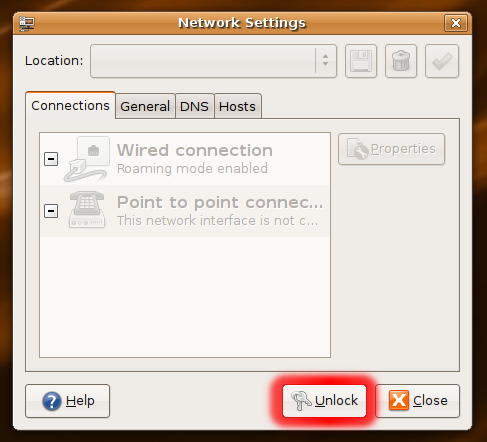
For details of PolicyKit integration in Hardy, refer to the policykit-integration blueprint.
Firefox 3 Beta 3
Firefox 3 Beta 3 replaces Firefox 2 as the default browser in Alpha 6, bringing much better system integration including icon and colour theming that matches the system, as well as GTK2 form buttons and open dialog.
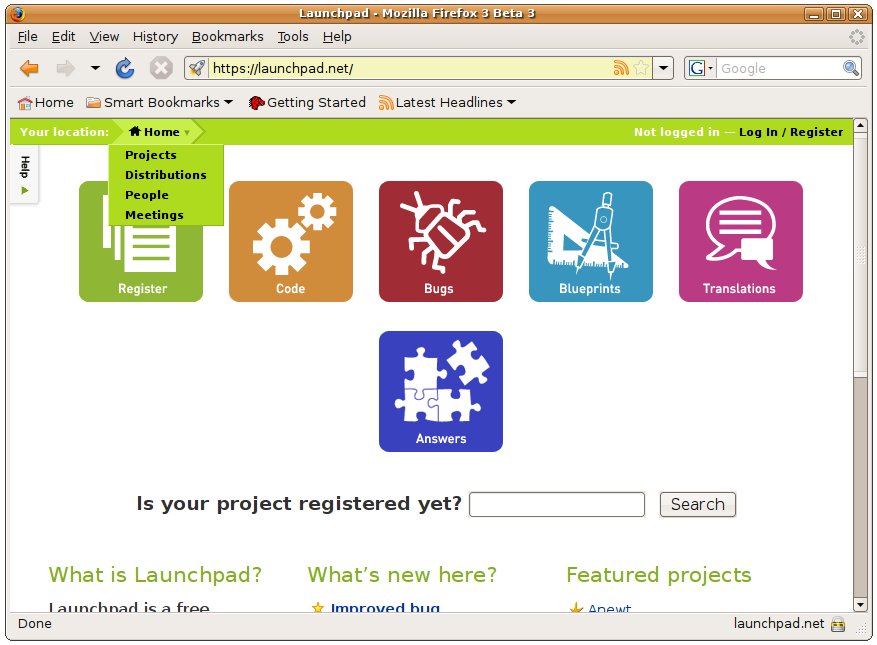
Transmission
The GTK version of the popular Transmission BitTorrent client comes with Alpha 6. It's set to replace the Gnome BitTorrent downloader.
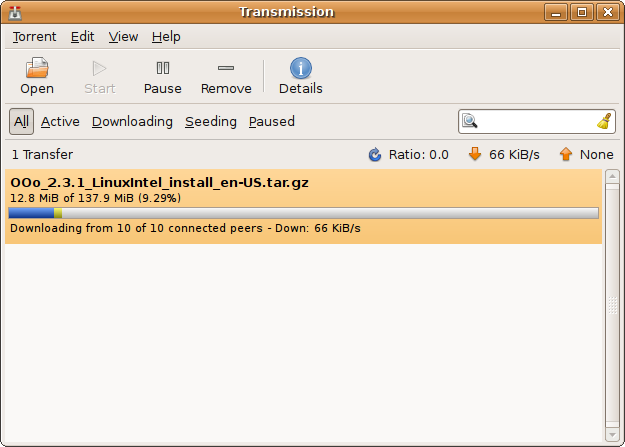
Vinagre
The new Vinagre VNC client is installed by default in Alpha 6, replacing xvnc4viewer.
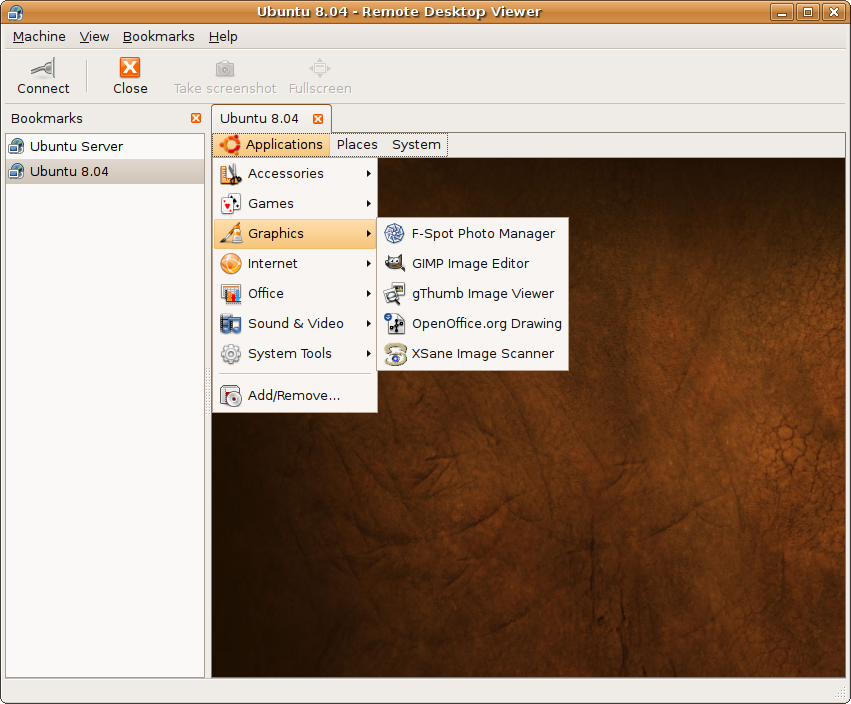
Vinagre allows the user to view multiple machines simultaneously, can discover VNC servers on the network via Avahi, and can keep track of recently used and favorite connections.
Brasero
The Brasero CD/DVD burning application, which will complement the CD/DVD burning functions of Nautilus and replace the Serpentine audio CD burning utility, is installed by default in Alpha 6.
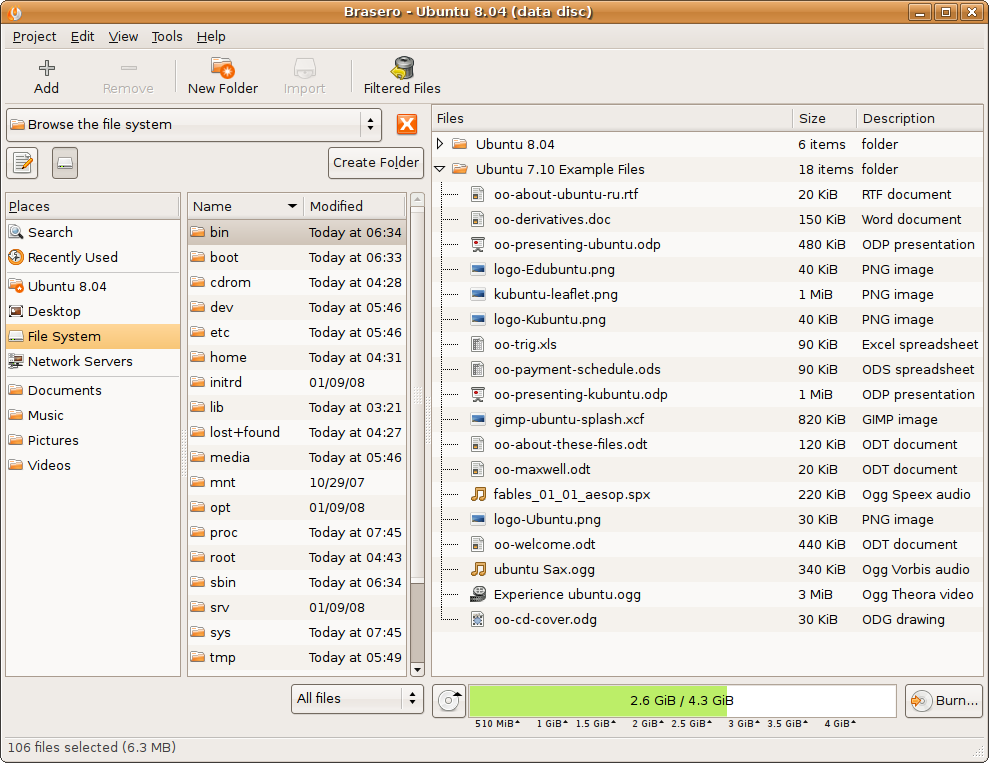
World Clock Applet
Integrating the features of the intlclock applet, the GNOME panel clock in Alpha 6 can display the time and weather in multiple locations.
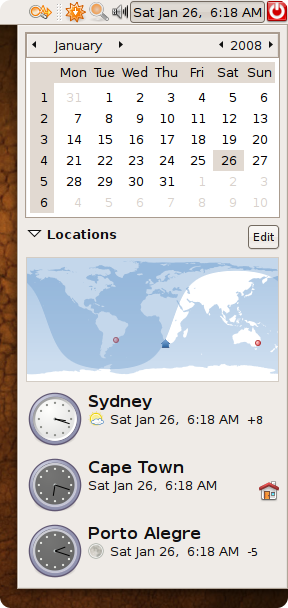
GVFS
Nautilus 2.21.6 in Alpha 6 uses GVFS, the virtual filesystem abstraction layer that's set to replace the aging GnomeVFS in GNOME 2.22, as its backend. In the near future, GVFS will make it possible to fix shortcomings of Nautilus such as the inability to restore files from trash, pause and undo file operations, and make it possible to escalate user privileges for certain operations using PolicyKit for authentication. It also brings a significant performance boost to many operations.
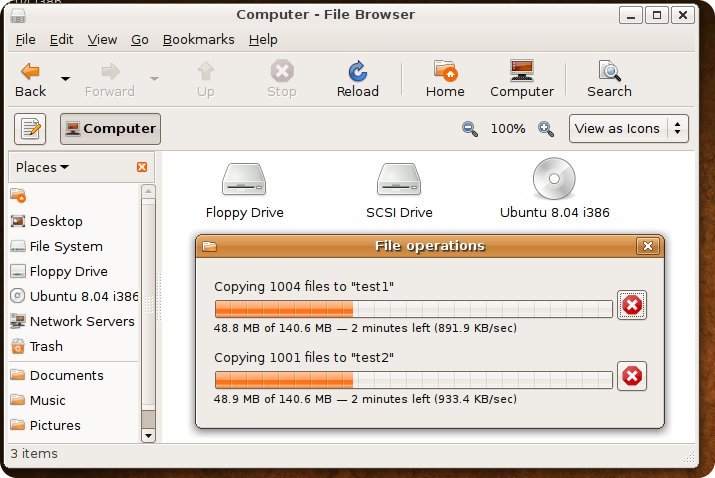
GNOME System Monitor
The GNOME System Monitor has a revamped "Resources" tab, with Cairo graphs that scroll and scale smoothly, and brand new widgets.
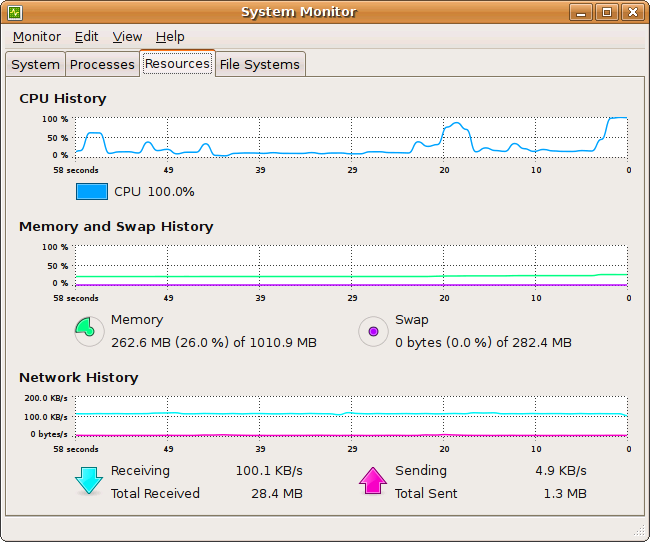
Virtualization
KVM is now officially maintained within the Ubuntu kernel.
libvirt and virt-manager have been integrated in Ubuntu. They allow for easy guest creation and basic management of virtual machines out of the box. Virt-manager can be used to administer guests on a remote server. They also work with XEN, even though it is not officially maintained.
The kernel also includes virtio greatly improving I/O performance in guests.
ActiveDirectory integration
Likewise Open is available from the universe repository. It enables seamless integration of Ubuntu within an Active Directory network. Users can use their AD credentials to log on Ubuntu machines and access any kerberized services provided by an Ubuntu Server.
iSCSI support
iSCSI Initiator has been fully integrated in the kernel, allowing Ubuntu to mount iSCSI targets as a block device. iSCSI is available in the Ubuntu Server installer if iscsi=true is passed on the kernel command line at the beginning of the install process.
Firewall
ufw (Uncomplicated Firewall) is a new firewall application designed to make administering a firewall easier for end-users while not getting in the way of network administrators. Currently, ufw is a command-line interface for administering host-based firewalls.
For more details, read the UbuntuFirewall specification.
Memory Protection
Additional access checks have been added so that /dev/mem and /dev/kmem can only be used to access device memory. These changes will help defend against RootKits and other malicious code.
The lower 64K of system memory is no longer addressable by default. This will help defend against malicious code that attempts to leverage kernel bugs into security vulnerabilities.
Applications compiled as Position Independent Executables (PIE) are now placed into memory in unpredictable locations, making it harder for security vulnerabilities to be exploited.
umenu
WinFOSS and the Windows open source software have been replaced by umenu, a simple launcher that lets the user install Ubuntu from Windows using Wubi (see below), install Ubuntu to a partition without having to make their CD-ROM the first boot device, and find out more about Ubuntu at the www.ubuntu.com website.
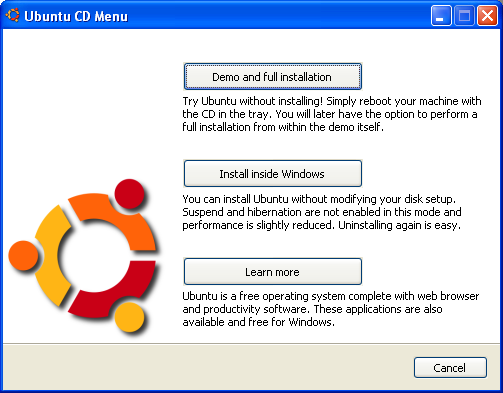
Wubi
There is a new installation option for Windows users. Wubi allows users to install and uninstall Ubuntu like any other Windows application. It does not require a dedicated partition, nor does it affect the existing bootloader, yet users can experience a dual-boot setup almost identical to a full installation. Wubi works with a physical CD or in stand-alone mode, by downloading an appropriate ISO to install from. It can be found on the root of the CD as Wubi.exe. A full installation within a dedicated partition is still recommended, but Wubi is a great way to try Ubuntu for a few days and weeks before committing dedicated disk resources.
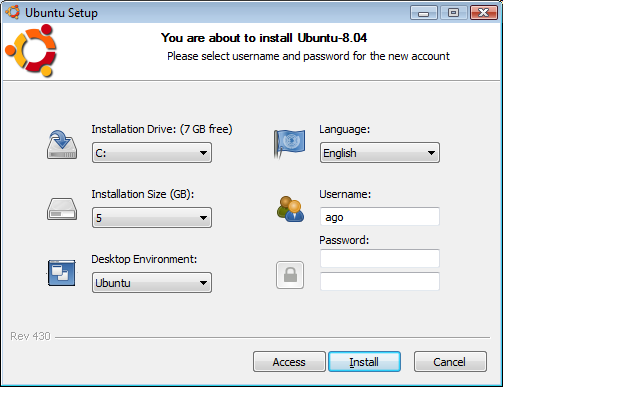
Installation
In the alternate and server CDs, most file systems are now mounted with the relatime mount option by default, for improved performance. This is not yet done by the desktop CD installer, but that will be in place by beta.
Download Alpha 6
Get it while it's hot. ISOs and torrents are available at:
http://cdimage.ubuntu.com/releases/hardy/alpha-6/ (Ubuntu)
http://cdimage.ubuntu.com/kubuntu/releases/hardy/alpha-6/ (Kubuntu)
http://cdimage.ubuntu.com/kubuntu-kde4/releases/hardy/alpha-6/ (Kubuntu with KDE4)
http://cdimage.ubuntu.com/edubuntu/releases/hardy/alpha-6/ (Edubuntu)
http://cdimage.ubuntu.com/jeos/releases/hardy/alpha-6/ (Ubuntu JeOS)
http://cdimage.ubuntu.com/xubuntu/releases/hardy/alpha-6/ (Xubuntu)
http://cdimage.ubuntu.com/gobuntu/releases/hardy/alpha-6/ (Gobuntu)
http://cdimage.ubuntu.com/ubuntustudio/releases/hardy/alpha-6/ (UbuntuStudio)
Caveats
There are several known bugs that users are likely to run into with Hardy Alpha 6. We have documented them here for your convenience along with any known workarounds, so that you don't need to spend time reporting these bugs again:
The kernel in Alpha 6 is unable to access CD-ROM devices in some configurations, which means some users who were previously able to install Ubuntu will not be able to install this alpha from CD media. As a workaround, users can boot the installer with the additional "all_generic_ide" boot option. https://launchpad.net/bugs/181561
Video problems have been reported with the 64-bit (amd64) version of Edubuntu desktop. As a workaround, users can manually specify a video resolution at the boot menu. https://launchpad.net/bugs/173130
Printing from Firefox beta 3 does not work. A fix will be available in a subsequent version of Firefox. https://bugs.launchpad.net/bugs/194486
Installation from the Live CD using the "auto-resize" partitioning option prompts for a password to mount partitions and triggers an error message. Investigation of this issue is ongoing. https://bugs.launchpad.net/bugs/199129
- Hibernation does not work in a Wubi installation. Even if this option is available on the desktop, you should avoid using it.
Upgrades from Ubuntu 6.06 LTS currently fail because of problems with python-central. See https://launchpad.net/bugs/198456
The "do not use" method in the installer's partitioner cannot be selected; this will be fixed in the next build. If you need this, run chmod +x /lib/partman/choose_method/70dont_use/choices from a root shell beforehand.
XFS cannot be selected in the alternate and server installer's partitioner; this will be fixed in the next build. If you need this, run chmod +x /lib/partman/finish.d/70aptinstall_xfs /lib/partman/valid_filesystems/25xfs from a root shell beforehand. The desktop installer is not affected.
Attempting to configure software RAID in the installer's partitioner causes a fatal error. This will be fixed in the next build. We apologise for the inconvenience. https://launchpad.net/bugs/198106
Reporting Bugs
It should come as no surprise that this alpha release of Hardy Heron contains other bugs. Your comments, bug reports, patches and suggestions will help fix bugs and improve future releases. Please report bugs through the Ubuntu bug tracker
If you want to help out with bugs, the Bug Squad is always looking for help.
Participate in Ubuntu
If you would like to help shape Ubuntu, take a look at the list of ways you can participate at
More Information
You can find out more about Ubuntu on our website and wiki.
To sign up for future Ubuntu development announcements, please subscribe to Ubuntu's development announcement list at:
Credits
The Alpha 6 release notes were brought to you by:
- Murat Güneş
- Timo Aaltonen
- Corey Burger
- Steve Langasek
- Agostino Russo
- Evan Dandrea
HardyHeron/Alpha6 (last edited 2008-08-06 16:40:25 by localhost)